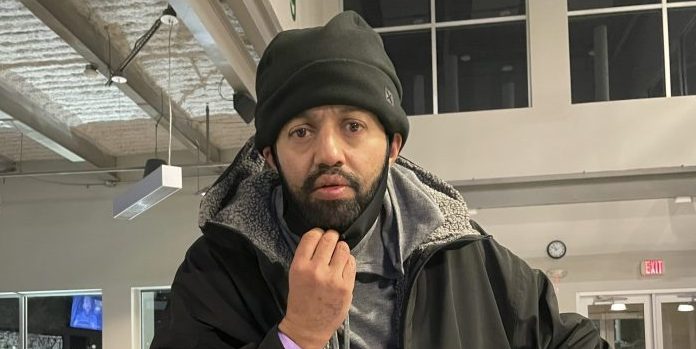(Headline USA) The al-Qaeda-loving British national who took four Jewish people hostage at a Texas synagogue in a 10-hour standoff that ended in his death was checked against law enforcement databases before entering the U.S. but raised no red flags, the White House said.
Malik Faisal Akram, 44, arrived in the U.S. at Kennedy Airport in New York on a tourist visa about two weeks ago, officials said. He spent time in Dallas-area homeless shelters before the attack Saturday in the suburb of Colleyville.
Akram was not believed to be included in the Terrorist Screening Database, a listing of known or suspected terrorists maintained by the FBI and shared with a variety of federal agencies, two law enforcement officials told The Associated Press. Had he been included, it would have been extremely difficult for him to get into the country.
“Our understanding, and obviously we’re still looking into this, is that he was checked against U.S. government databases multiple times prior to entering the country, and the U.S. government did not have any derogatory information about the individual in our systems at the time of entry,” White House press secretary Jen Psaki said Tuesday.
She added: “We’re certainly looking back … what occurred to learn every possible lesson we can to prevent attacks like this in the future.”
The Biden administration’s terrorist screenings have fallen under harsh scrutiny, however, as it maintains an open border through which foreign-born terrorists might easily pass while also focusing the bulk of its energy and rhetoric on labeling Americans who disagree with radical leftist policies as “violent extremists,” “domestic terrorists” and “white supremacists,” the latter even if they are not white in some cases.
At the very least, Akram’s admittance appears to have been a glaring intelligence oversight exacerbated, in part, by politically correct culture that casts a sympathetic eye toward Muslim extremists.
British media, including the Guardian, reported Tuesday that Akram was investigated by the domestic intelligence service MI5 as a possible “terrorist threat” in 2020, but authorities concluded he posed no danger, and the investigation was closed.
Britain’s Home Office did not immediately comment on the reports.
Despite Akram’s apparent affinity for the notorious al Qaeda terror cell, leftists insisted that the case illustrated once more the difficulties in identifying potential lone-wolf attackers.
The standoff in Colleyville, a city of about 26,000 people 30 miles northwest of Dallas, ended after the last of the hostages ran out of the synagogue and an FBI SWAT team rushed in. Akram was killed, though authorities have declined to say who shot him.
President Joe Biden called the episode an act of terror.
Rabbi Charlie Cytron–Walker, who was among the hostages, told CBS that he had let Akram into Congregation Beth Israel because he appeared to need shelter. The rabbi said the man wasn’t threatening or suspicious at first, but later he heard a gun click as he was praying.
One hostage was released hours later, and the rabbi and two others later escaped after Cytron–Walker threw a chair at the gunman.
During the standoff, Akram could be heard on a Facebook livestream demanding the release of Aafia Siddiqui, aka “Lady al-Qaeda,” a Pakistani neuroscientist who was convicted of trying to kill U.S. troops in Afghanistan. The prison where Siddiqui is serving her sentence is in nearby Fort Worth.
An attorney in Texas who represents Siddiqui said the prisoner had no connection to Akram.
The investigation stretched to England, where over the weekend police announced two teenagers were in custody in connection with the standoff. The teenagers are Akram’s sons, two U.S. law enforcement officials told AP. The officials were not authorized to discuss the investigation and spoke on condition of anonymity.
On Tuesday, police in Britain said the teenagers had been released without charge.
Akram is from the English industrial city of Blackburn. His family said he had been “suffering from mental health issues.”
Investigators believe he had initially traveled to New York believing that Siddiqui was still being held there—where her trial occurred—without realizing she had been sent to a federal prison in Texas.
During the standoff, Akram forced Cytron–Walker to call Angela Buchdahl, the senior rabbi at New York’s Central Synagogue, in a bid to win Siddiqui’s release.
In at least one subsequent call, Akram ranted and demanded that Buchdahl try to get Siddiqui freed, an official said. Buchdahl called 911 and reported the calls to New York City police.
Investigators are still sorting through Akram’s movements in the U.S. and reviewing his financial and phone records, but believe he may have traveled by bus to Texas, two of the officials said.
Authorities believe he bought the handgun used in the hostage-taking in a private sale, according to a person familiar with the matter who spoke on condition of anonymity because the investigation is still going on.
In another major terrorism case, Omar Mateen, who killed 49 people at an Orlando, Florida, nightclub in 2016, had been investigated repeatedly by the FBI but not charged. The Orlando massacre and other attacks prompted the FBI to launch an internal review of how it handled tips and leads in terrorism investigations.
Adapted from reporting by the Associated Press

